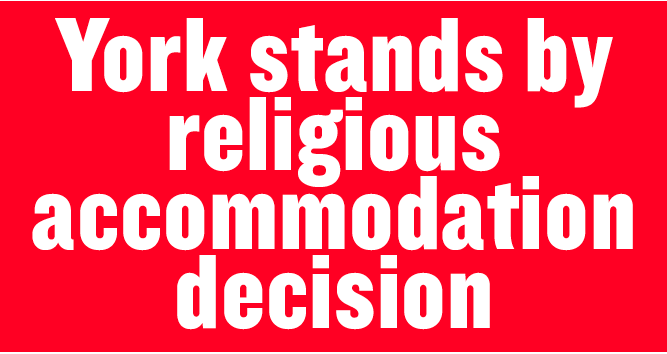
York administration continues to stand by its decision to accommodate a student who requested, on religious grounds, not to work with women on a group project.
Meanwhile, the professor who refused the request has received an outpouring of support from across Canada.
In a letter obtained by Excalibur, Martin Singer, dean of the faculty of liberal arts and professional studies, wrote to his colleagues that he wished he had another choice in the matter, but that neither he, nor those he has consulted with, believe he did.
“I am dismayed that the decision to accommodate has been characterized as an endorsement of the student’s belief system, and as a betrayal of York’s decades long efforts toward gender equity,” wrote Singer.
He went on to express “sincere regret” that such a request, given the specific circumstances, had to be accommodated.
Support for J. Paul Grayson, the professor who first received the request and refused to comply with the university’s decision, has come from students, faculty, and from outside the university. His actions have sparked a discussion on religious accommodation across the country.
“So much has happened that it is hard to summarize,” says Grayson. “I’ve received hundreds of emails from all over the world and the response has been 100 per cent positive. I have not had one email in which there has been an expression of disappointment.”
Grayson says he has heard from shocked parents, who say they wouldn’t send their daughters to York, and alumni who are considering stopping their contributions to the university. He has done dozens of radio interviews and TV appearances, and his story has been discussed in newspapers nationwide.
The York University Graduate Students’ Association has also released a statement condemning the administration’s decision to grant the request.
“[The decision] raises questions about the university’s procedures for handling such cases as they may have arisen in the past, and sets a dangerous precedent for future accommodation requests of this nature,” said the statement.
Danielle Carter, an affiliate of Feminist Action at York, says the administration’s actions have demonstrated “women’s rights are not a priority at York.”
“It is possible that this case will set a precedent for future gender based discrimination on campus,” she writes. “Such a prejudicial standard is unacceptable.”
In September, a student in Grayson’s sociology class sent him an email requesting that he be exempt from conducting a focus group, a requirement of the otherwise web-based class, because his religious beliefs prevented him from interacting with women.
“One of the main reasons that I have chosen internet courses to complete my BA is due to my firm religious beliefs, and part of that is the intermingling between men and women,” the student wrote. “It will not be possible for me to meet in public with a group of women (the majority of my group) to complete some of these tasks.”
While Grayson’s initial reaction was that granting this request would be a giving a “tacit support to a negative view of women,” he forwarded the email to Singer, looking for a principled statement from York.
Grayson was surprised when he was told the request would have to be granted since an accommodation had already been made for another student who lived far away and was unable to make it to campus to complete the assignment.
“There was no way I was going to put myself in a position where I was going to take a discriminatory action against female students,” he says.
He raised the issue at an October department of sociology meeting, where it was unanimously decided that accommodations should not be granted “if they contribute to material or symbolic marginalizations of other students, faculty or teaching assistants.”
Grayson wrote to the student explaining that his request could not be accommodated, but in another email, the dean’s office informed the student that the department would find alternate means to grade him and if he wished, he could drop the course and receive a full tuition fee refund.
After considering these responses, the student agreed to come onto campus and complete his assignment. He also thanked Grayson for how he handled the request, noted that his religion allowed for exceptions, and wrote, “I look forward to continuing in this course.”
“I want to point out there’s no problem with the student,” says Grayson. “He’s been polite, graceful, he’s been reasoned.”
Neither the student’s identity or his religion have been released for privacy reasons.
Singer’s letter echoed the sentiments expressed in statements from York’s President and Vice-Chancellor Mamdouh Shoukri and Vice-President Academic & Provost Rhonda Lenton.
Lenton and Martin wrote that a deciding factor in this case is that this was an online course in which another student was allowed to conduct the focus group off campus. Lenton also emphasized York’s commitment to gender equity, inclusivity, and diversity in her statement.
In Grayson’s response to Singer’s letter, he pointed out that in the official departmental description and in module 1 of the sociology course, it is stated that students are required to conduct focus groups and that the student “should have been aware that he would be required to interact with others in the course even though it was online.”
Grayson also wrote that the student is currently taking two other in-class courses.
As of publication, Grayson has not had any further contact with the administration.
Tamara Khandaker
Editor-In-Chief



